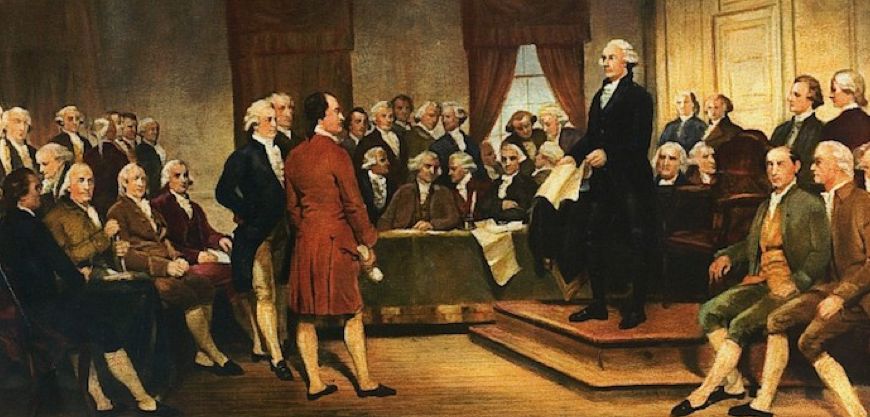CommentsBCK FILE--When the Founding Fathers met in Philadelphia, it’s almost as if they had a crystal ball to foretell a president who would abuse the office in order to achieve, hold onto, and expand his powers.
Today, 232 years later, what was a sometimes contentious debate over the risks of limitless powers and how to reign in potential abuses of the executive branch, the Trump presidency seems to be a test case of the Founders’ fears.
Seen through the prism of history, it makes sense that the framers wanted to ensure too much power did not rest in the hands of one leader or branch. The framers were influenced by Montesquieu and William Blackstone, as well as others, in their aim to establish a system of checks and balances through three branches of government.
“It is by balancing each of these powers against the other two that the efforts in human nature toward tyranny can alone be checked and restrained, and any degree of freedom preserved in the Constitution,” wrote John Adams.
In 1775, Thomas Jefferson had written, “A fondness for power is implanted, in most men, and it is natural to abuse it when acquired.”
James Madison, Benjamin Franklin, James Wilson, and Governor Morris debated about the Impeachment Clause at the convention. Even after the convention, Alexander Hamilton had written in favor of the constraints of impeachment in two essays dedicated to impeachment.
Hamilton feared an unscrupulous power-hungry leader might bring risks to the country. In fact, during the earliest days of the Revolutionary War, he wrote, “When avarice takes the lead in a State, it is commonly the forerunner of its fall.” Although he did support a strong federal government, he penned two essays about impeachment, expressing concerns over what he described as a “restless” and “daring usurper.”
In The Federalist Papers No. 1, Hamilton wrote “a dangerous ambition more often lurks behind the specious mask of zeal for the rights of the people than under the forbidden appearance of the zeal for the firmness and efficiency of government. History will teach us that...of those men who have overturned the liberties of republics, the greatest number have begun their careers by paying an obsequious court to the people, commencing demagogues, and ending tyrants.”
To Hamilton, “the abuse or violation of some public trust” could warrant impeachment. “If the federal government should overpass the just bounds of its authority and make a tyrannical use of its powers,” the people must “take such measures to redress the injury done to the Constitution as the exigency may suggest and prudence justify.” Hamilton believed impeachment charges should be addressed with “caution and investigation” but beyond a symbolic gesture.
Virginia’s George Mason, James Madison, and Edmund Randolph were integral in setting what would constitute an impeachable offense. Mason, who ultimately did not sign the Constitution, argued for more expansive grounds beyond treason or bribery. “Shall any man be above justice? Shall that man be above it who can commit the most extensive injustice? Shall a man who has practiced corruption, and by that means procured his appointment in the first instance, be suffered to escape punishment by repeating his guilt?” he argued. Mason disagreed with the argument of leaving the consequences to the election. “He might pervert his administration into a scheme of peculation” -- “He might betray his trust to foreign powers.”
It was Mason who came up with the broader category of “other high crimes and misdemeanors,” left subject to interpretation to provide additional protection from executive abuses.
The Founding Fathers and framers were remarkably prescient when it came to potential abuses of power and the risks to democracy of placing most power in the hands of an executive or any one branch. As concerned as they were about potential abuses of power, the framers also included checks and balances to prevent capricious uses of impeachment to remove a president from office. Only Presidents Andrew Johnson and Bill Clinton were formally impeached by Congress -- and only President Trump and Nixon faced formal impeachment charges in the U.S. House of Representatives.
As the House prepares to vote this week to impeach President Trump, key Senate Republicans have been publicly considering how to conduct the Senate impeachment trial, expected to begin in January. Mitch McConnell said last week that there was “no chance” that Trump would be removed from office. The Republican defense of Trump along party lines is something Hamilton warned against. ““If there be no penalty annexed to disobedience, the resolutions or commands, which pretend to be laws will, in fact, amount to nothing more than advice or recommendation,” he wrote.
(Beth Cone Kramer is a professional writer and covers The Resistance and other important and topical issues for CityWatch.)
-cw
















